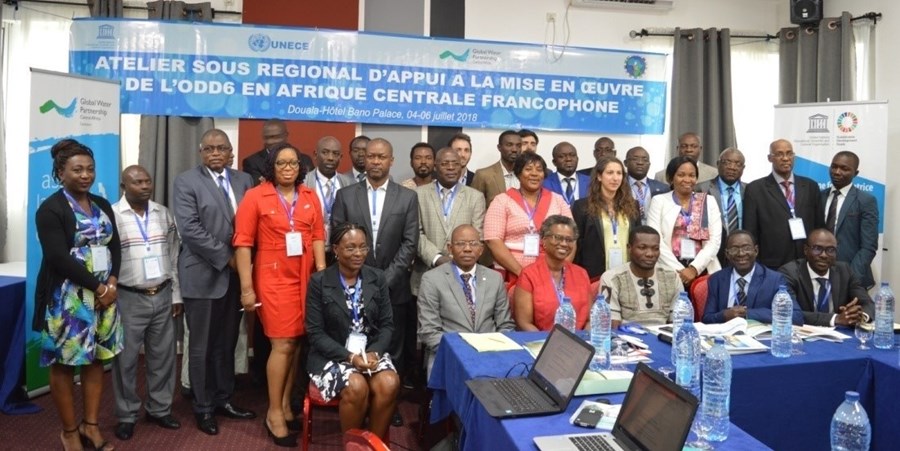In partnership with UNESCO and UNECE, Global Water Partnership-Central Africa (GWP-CAf) organized a sub-regional workshop to support the implementation of SDG 6 in Central Africa in Douala, Cameroon, under the chairmanship of the Minister of Water and Energy of Cameroon from July 4–6th, 2018.
The objectives of this meeting were to enable the countries of Central Africa to better understand the whole process of the SDGs, the deadlines linked to Agenda 2030 and to share the instruments of governance of water resources in Central Africa. For Ligia Barros, chair of GWP-CAf, this workshop was “an opportunity for countries to better understand the process and methodology for monitoring Indicator 6.5.2 of SDG 6, and especially to identify ways to accelerate the implementation of target 6.5 of SDG 6, and facilitate integrated monitoring of SDG 6.”

Participants at the sub-regional workshop on implementing and tracking transboundary water management. Image Credit: GWP-CAf
Target 6.5 aims for the implementation of “integrated water resources management at all levels, including through transboundary cooperation as appropriate.” As reported by Water Canada at the end of June, several large transboundary African organizations met to discuss plans for securing financing to support transboundary projects, including for water. The indicator 6.5.2 counts the basin area within an operational arrangement for transboundary cooperation.
According to Daniel Claude WANG SONNE, representative of the Minister of Water and Energy, this workshop came at the right time to better help implement this indicator. “The development and management of water resources generally lack coordination between government services and the different sectors, which makes it difficult to provide information on indicator 6.5.2,” said WANG SONNE.
The three days of work were structured around expert presentations in plenary sessions, exchanges, and group work. As a result of this work, recommendations were formulated for countries, transboundary basin organizations, ECCAS, and depository agencies, such as:
- Mobilize financial resources to support national teams in the intelligence process of monitoring reports (collection and analysis of information, organization of consultation workshops, etc.);
- Formalize the process for designating focal points and clarify the validation mechanism for the report;
- Further facilitate integrated monitoring of SDG 6 at national level, at least between indicators 6.5.1.
The workshop found success in enabling the countries to understand the whole process, to better use the instruments of water resource governance in Central Africa to share experiences and to contribute to the improvement of the methodology document and the production process of the next monitoring report.
About 30 participants took part in this most recent meeting. Experts representing countries (Burundi, Cameroon, Congo, Chad, Gabon, CAR, DRC and CAR), basin organizations (CBLT, CICOS), development partners (BAD, UNDP), research institutions (University of Douala) and organizing institutions were present: UNESCO, the United Nations Economic Commission for Europe (UNECE), Global Water Partnership for Central Africa (GWP-CAF) and the Economic Community of Central African States (ECCAS).












